Stefanie Finch marries food planning with technology to keep patients and residents healthy and well-fed! I had the pleasure of interviewing her to learn about her role as a regional diet office dietitian and coordinator for the UBC Dietetics Integrated Internship program.
Tell me about your career as a dietitian.
I started my career as a registered dietitian in 1992, working at the Ottawa General Hospital as a clinical dietitian. I started my career with Northern Health (NH) as a renal (kidney) dietitian, and I’ve been employed by NH for the past 15 years! In 2013, I moved into my current role as the Regional Manager of Food and Nutrition Systems, where I manage the Regional Diet Office and, for my first few years, was in charge of developing and implementing the CBORD system across NH.
CBORD is a food and nutrition computer system used in health care – it facilitates food services in all our hospitals and long-term care facilities. Using CBORD, the Regional Diet Office (RDO) maintains menus, patient/resident diet and allergy information, and supports other CBORD users (including Food Services staff, dietitians, speech-language pathologists, and occupational therapists) in managing patient/resident dietary needs.
What do dietitians do?
Dietetics is a very diverse profession, and what a dietitian does day-to-day really depends on the role they’re in. I’ve had several roles in my 28 years as a dietitian, from food service and managing kitchens, to working in a clinical setting as a renal dietitian.
In my current role managing CBORD and the RDO, I work with and support all NH users of the program. This role is more focused on food service and technology than clinical support of clients. Having a regional role, I’m fortunate to be involved in a little bit of everything from collaborating with the clinical dietitians and our allied health partners, to supporting all our food service teams in their food service operations.
Could you describe a day in your life as a dietitian?
Everyday is different, as I oversee many different types of work our department does on an ongoing basis. I work very closely with IT, so if there are technical issues with CBORD or the supporting systems, I might focus on that.
My team is responsible for entering all diet changes in the health authority in the CBORD system, ensuring all appropriate printed documentation is sent to the sites so patient, and resident meals are served in a timely manor with the correct foods allowed on their diets.
My team is also responsible for the regional menu for NH. Twice a year, we update the menu based on site feedback. We’re often testing products to ensure they’re meeting our standards, as well as coding the items for the appropriate ingredient and nutritional profile in CBORD.
We also work in collaboration with the Ministry of Health and Agriculture to meet ministry guidelines. A day will encompass a little bit of all of this, sometimes more of one than the other depending on what comes up.
What’s one thing someone might not know about your role?
There’s a large amount of IT work in my role – it’s a cross between nutrition and technology. It’s funny because I’m not techy at home, but at work, I use a lot of IT language. My role requires a lot of problem solving, often on-the-spot. For example, when there’s outages (planned or unplanned) anywhere in NH, we have to know what to do – how we’ll communicate to sites, what our back-up plan is for getting meal information to sites for all their patients/residents, etc. I like that my job requires me to think on my feet – you have to be flexible and adaptable!
What part of your role is the most rewarding?
In 2006, my colleague Shelley Pallot and I took on the managing of the students in the University of British Columbia (UBC) Dietetic Integrated Internship program in NH. We saw it as an opportunity to plan for the future of NH dietitians and recruit dietetic students to come work in the North. NH has an amazing group of dietitians who offer such a diverse experience to the students during their 10-month practicum. We’re proud to say that almost 50% of our graduates stay and work in the North. I find it very fulfilling to work with students and contribute to their learning. At the same time, they keep me on my toes and make me think about my own practice from a different perspective.
I also really enjoy the problem solving part of my job. It’s rewarding when you can figure out a solution to someone’s problem to help them do their work better. I work with a great team that comes up with great ideas, so that helps! I like to say, “you’re as good as your team — if your team is good, the whole department runs well.”
How to see a registered dietitian
Do you think you, your patients, or someone you know could benefit from talking to a dietitian?
- There are dietitians in communities across NH; however, you might need a referral. Talk to your health care provider to learn more.
- BC residents can also access Dietitian Services at HealthLink BC by calling 8-1-1 (or 604-215-8110 in some areas) and asking to talk to a dietitian.






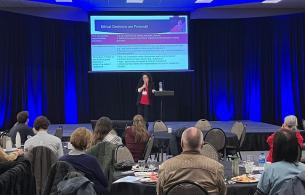

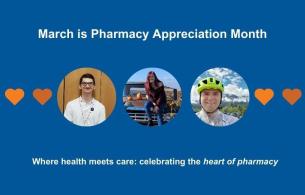
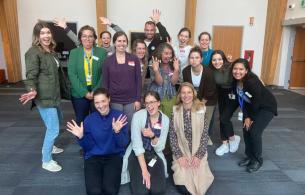
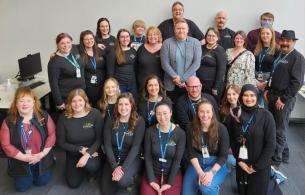

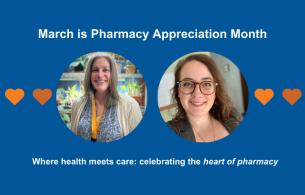

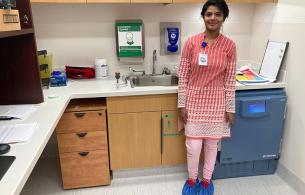
Comments